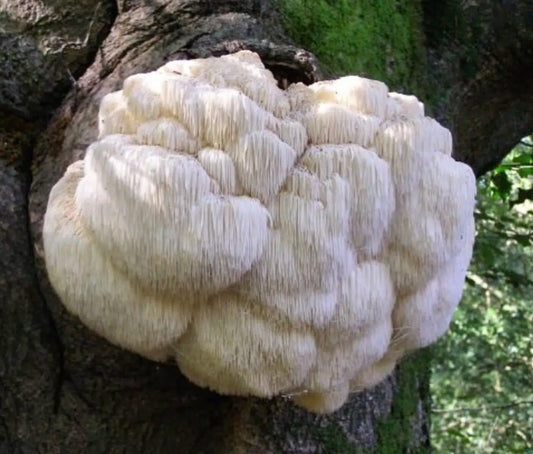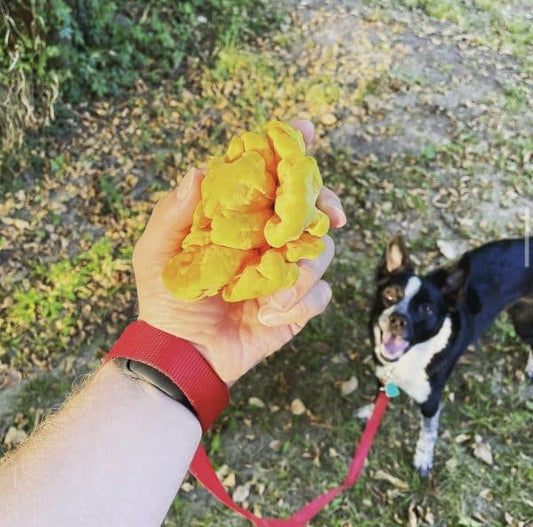How Do Mushrooms Improve Mental Health
Edible mushrooms of all types offer both general health benefits and mental health benefits. However, some specific mushrooms improve mental health significantly. Research has shown that mushrooms containing high quantities of ergothioneine, hericenones, and psilocybin can improve mental health by both scavenging free radicals and regenerating the brain. In other words, mushrooms can put a stop to and even reverse degenerative mental health diseases.Certain mushrooms improve mental health by neutralizing free radicals, reducing brain inflammation, promoting NGF synthesis, stimulating BDNF secretion, and temporarily halting the Default Mode Network (DMN).
A 2006 study in Japan found a correlation between mushroom consumption and dementia in individuals over the age of 65. This study divided 13,230 people into three categories based on how often they consumed mushrooms: those who ate them more than three times a week, those who ate them only once or twice a week, and those who rarely or never ate them. The results of this study indicated that elderly individuals who consumed the greatest amount of mushrooms had the lowest rates of dementia. (Zhang et al., 2017)Another study that took place in Singapore confirmed the former Japanese study. In this study, 663 individuals over 60 who consumed mushrooms more than twice a week were compared to their peers who rarely ate or never ate mushrooms. Individuals who ate the highest number of mushrooms per week had greatly reduced mild cognitive impairment than individuals who ate the fewest number of mushrooms. (Feng et al., 2019)
Cultures that eat more mushrooms have a reduced rate of neurodegenerative diseases than cultures that eat fewer mushrooms. This is confirmed in both Italy and France where mushroom consumption is more common than in places like the United States, where most people typically don’t consume mushrooms. (Penn State, 2017)
While there are many compounds in mushrooms that are crucial for ideal mental health, one amino acid, known as ergothioneine, stands head and shoulders above the pack.
Ergothioneine – The Mental Health Miracle Molecule
Ergothioneine is an amino acid that is found in a variety of foods but is highly concentrated in mushrooms. While food like beans, pork, and chicken have minuscule amounts of ergothioneine, certain mushrooms contain hundreds of times more ergothioneine.
Unfortunately, common white button mushrooms only have 0.46 mg of ergothioneine per kilogram. However, certain mushrooms like Oyster, Lion’s Mane, and Shiitake mushrooms contain 100 to 300 mg of ergothioneine per kilogram. At the top of the chart, the Branched Oyster mushroom contains greater than 2,000 mg of ergothioneine per kilogram. (Ey et al., 2007)
Ergothioneine reduces oxidative stress that damages both proteins and DNA by neutralizing peroxynitrite and hydrogen peroxide. (Aruoma et al., 1999) This indicates that ergothioneine is a strong antioxidant.
Ergothioneine And Parkinson’s Disease
A study from 2015 identified the pathogenesis and common biomarkers of Parkinson’s disease. Individuals suffering from Parkinson’s disease all had low levels of ergothioneine, tryptophan, bilirubin, and caffeine. (Hatano et al., 2016) Since low ergothioneine levels were noted, the assumption is that oxidative stress could not be effectively neutralized, leading to Parkinson’s disease.
Ergothioneine And Alzheimer’s Disease
Cerebral inflammation is a common characteristic among Alzheimer’s patients. Specifically, 7-ketocholesterol (7KC) levels are elevated in the cerebral cortical tissue of Alzheimer’s patients. Ergothioneine has been shown to reduce inflammation by reducing 7KC levels. (Koh et al., 2021) In this manner, ergothioneine may directly counteract the development of Alzheimer’s disease.
Ergothioneine And Depression
Ergothioneine has been shown to offer antidepressant action in a study on rats that took place in 2016. After feeding rats ergothioneine every day for 14 days, the forced swimming test and tail suspension test demonstrated that ergothioneine was shown to reduce depression.
(Nakamichi et al., 2016)

Lion's Mane Improves Mental Health
Not only do Lion’s Mane mushrooms contain ergothioneine, but they also contain erinacines and hericenones. These unique compounds are conducive to good mental health, as they promote NGF synthesis. Lion’s mane improves condition by promoting neural growth.
Hericenones
Hericenones, found in Lion’s Mane mushrooms, are neuroprotective and anti-inflammatory. They also stimulate Nerve Growth Factor (NGF) production, which promotes the growth and development of nerve cells. (Lai et al., 2013)
Hericenones have been shown to reduce anxiety, improve mood, and improve cognitive function. These mental health benefits of hericenones offer a promising natural treatment for conditions like anxiety and depression. Additionally, the cognitive-enhancing effects of hericenones make them a potential treatment for Alzheimer’s disease and other forms of dementia. (Mori et al., 2011)
A study showed that consuming 250 mg of Lion’s Mane extract three times a day for one month significantly improves cognition in individuals with mild cognitive impairment. (Mori et al., 2009) Lion’s Mane mushrooms are also noted for their antidepressant effects. A 2010 study showed that subjects who consumed Lion’s Mane for one month had lower rates of depression and anxiety than the control group. (Nagano et al., 2010)
Lion’s Mane exerts its antidepressant effects by facilitating BDNF secretion, increasing neuroplasticity, and allowing the brain to replace worn-out neurons with new, functional neurons. (Chiu et al., 2018)
Consuming Lion’s Mane mushrooms along with psilocybin mushrooms increases BDNF secretion more, leading to a synergistic improvement in cerebral form and function. This is why Paul Stamets, an expert mycologist, recommends consuming Lion’s Mane and niacin while microdosing psilocybin.
Psilocybin Mushrooms And Mental Health
Psilocybin mushrooms are one of the most exciting treatment options available for a wide range of mental health conditions including depression, anxiety, OCD, and addictions of all types. Additionally, psilocybin shows promising action against Alzheimer’s and dementia.
Psilocybin is completely legal in some locations, completely illegal in other locations, and sits in a legal gray area in many regions, making it one of the most misunderstood substances on the planet. Fortunately, Johns Hopkins has been actively studying the medical benefits of psilocybin and now has over 60 peer-reviewed scientific studies on this miraculous substance. (Ercolano, 2022)
Upon consumption, psilocybin is converted into psilocin, passes through the BBB, and exerts its effects by binding to the frontal cortex 5-HT2a receptors. This results in the secretion of both BDNF and glutamate. (Gallenstein & Gallenstein, 2021)
While some people erroneously believe that psilocybin damages the brain, a study on mice shows that a dose of psilocybin actually increased neuron connections by 10%. (McMillan, 2021) In other words, psilocybin is a brain builder, not a brain destroyer. BDNF secretion increases the number of synapses formed, improves dendritic spine growth, and increases dendritic arbor complexity. (Chapleau et al., 2009) This is how psilocybin is able to treat a wide range of mental health issues, as it physically repairs brain tissue, allowing it to regain normal function.
Treating Depression With Psilocybin
A study from the year 2014 published in the Journal of Psychopharmacology noted that those who were clinically depressed and consumed psilocybin had lower rates of anxiety, stress, and depression. (Marschall et al., 2022)
A trial on treating depression with psilocybin ended up with 71% of participants feeling much better after consuming psilocybin and 58% of participants were still depression-free one week after treatment. One month after the trial, 54% of participants no longer suffered from depression. (Davis et al., 2021)
These studies and others have convinced the FDA to grant breakthrough therapy status to use psilocybin to treat Major Depressive Disorder (MDD) if no other common treatment options offer relief. (Saplakoglu, 2019)
Psilocybin To Treat Addictions
Psilocybin has been shown to help people break harmful addictions. Psilocybin is able to help stop bad habits by decreasing default mode network (DMN) activity. (Psychedelics, 2021)
The DMN is what constitutes how we see ourselves in this world and our internal thoughts. With addictions, our internal thoughts continuously remind us to take part in addictive activities and most people are unable to turn off or ignore this negative thought process. Psilocybin places the DMN on pause so addicts can take a break from their negative internal dialogue, enjoy a moment of clarity, and decide for themselves that they don’t want to partake in addictive behavior anymore.
Psilocybin shows promise in treating both alcohol and tobacco addiction. In one study, psilocybin consumption reduced alcohol consumption by 27.2%. (Daniel & Haberman, 2018) In a course that used psilocybin to treat tobacco addiction, 80% of the participants completely gave up smoking immediately after consuming their first dose of psilocybin. Even more shocking, all of these individuals were still free of tobacco six months after consuming psilocybin. (Daniel & Haberman, 2018)
Psilocybin And Alzheimer's
Psilocybin may offer protection against Alzheimer’s disease because BDNF rebuilds neural tissue. Currently, Johns Hopkins is studying psilocybin and its potential to stop, reverse, and treat Alzheimer’s disease. (Garcia-Romeu et al., 2021)

Mushrooms Improve Mental Health
Mushrooms improve mental health through many different pathways. One thing is clear, if you want to maximize your mental health, you might consider eating mushrooms. While white button mushrooms have their place, studies show that the healthiest mushrooms are Oyster, Shiitake, and Lion’s Mane. Depending on the laws in your area, psilocybin mushrooms may also be a viable option.If you want to grow Oyster and Lion’s Mane mushrooms, allow us to help you out with our mushroom grow kits. When you buy your mushroom supplies and grow kits from us, we donate a portion of the sale to maps.org.
MAPS, otherwise known as the Multidisciplinary Association For Psychedelic Studies, is “the largest psychedelic gathering in history” and is leading the drive in the promising field of psychedelic research. On MAPS, you can find science-based information regarding psychedelic research and stay up-to-date with the newest developments in the field.
We support the work of organizations that are working to treat mental health conditions with substances that have the potential to correct problems, leading to a more functional society and a more meaningful existence.



